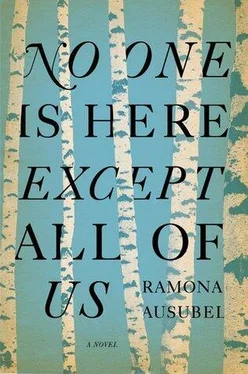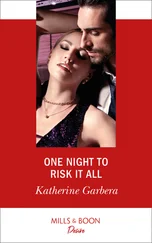We slumped so low we had no choice but to sit on the side of the road, in a puddle under a willow tree. We leaned against one another. Kayla put her head on Hersh’s shoulder, I put my head in Kayla’s lap, Hersh leaned down to the ground. Kayla did not protest anymore, she just listened half-eared to the accounting. Hersh kept talking quietly, lost in the maze. And I kept exact track, trying to remember what I was allowed to know now.
“A choice is what your mother and I made when we had you. We asked for you. To ask is when you say please. To say is to use your mouth to make words. Words are what we say. We is all of us. We are all we.”
We lay back on the ground. We put our heads on the stones, the stones from the mountains, the mountains from the earth. The earth from the bottom. All of it soaked with rain, puddles tugging the fabric of our clothes.
“God is also what we all are. God is more than anything. More is more. Anything is God. There is no way to say God without saying Everything.”
The rain hit us on our skin. The stones rounded our backs. The calling of a dog was answered by the calling of another dog. We closed our eyes and Hersh and Kayla did not say words for a long time. They breathed. All that happened was everything.
“I give up,” Kayla said, closing her eyes. “There is too much.”
“We have time,” Hersh told her.
“We have nothing. We need help. Hire all the teachers you can so Lena knows how to protect herself against every awful thing in the world. This child will never grow up if we don’t.”
I closed my eyes and prepared for the next wave to cover me.
The Committee for What We Have and Where We Have It was made up of the barber, the greengrocer and the greengrocer’s wife — who had appointed herself an auditor because she insisted any accuracy in her husband’s work was due to luck, not diligence.
The Committee for What We Have and Where We Have It found that some people were coming up short. Without outsiders to sell his jewelry to, the jeweler was struggling. The banker’s piles of coins were smaller because money was not being saved up but constantly traded. Yet when the jeweler proposed he learn to help grow and harvest wheat instead of repair watches and set gems in gold, we hated the idea. What good was a little town without a friendly, nearsighted man from whom to purchase gifts to mark the moments of our lives? Women refused to imagine their days without that window display to dream over, and men had a hard time knowing how else they might express their ongoing devotion. While it was true that nothing new entered our village — no money, no clothes, no fruit — nothing left it, either. The plants offered new seeds, and evidently enough sunlight filtered through the clouds, because the plants kept growing. It would be sufficient for all of us, if we managed it right. We voted to pay everyone enough in bread, in meat, in milk, to continue to do the jobs they were put in our town to do. Instead of money, we traded goods. The banker’s job began to include keeping track of IOUs — for this pair of earrings made of rubies, which the greengrocer wanted for his wife, he would deliver a basketful of vegetables at the start of each week for three months. For the service of making sure everything was fair, the banker was given a little of what everyone else earned.
Once they had catalogued and remedied shortfalls, the Committee for What We Have and Where We Have It set to work on a map. They paced the edges of our village, feet one in front of the other, toe to heel in a jagged circle. Their finding was that it took 10,034 of the barber’s feet to circle the village. That number tickled us. A total, an exact and complete measure of the space we occupied. We asked the Committee for What We Have and Where We Have It to measure more. The banker was found to have the biggest house but the smallest windows. The chicken farmer had the smallest house but the tallest door.
When they had measured everything big and logged it, the jeweler, whose whole life had been lived based on miniature objects, begged them to find a way of measuring things that were small. They devised two new lengths of measurement: the length of the barber’s left first finger, and the full moon of his thumbnail. The Committee for What We Have and Where We Have It grew tired of being chased with unmeasured brooms, butter dishes, baby shoes. They voted among themselves on a rule to measure things only at the start of each month when the moon was new. The rest of the time they would draw a map of the village and keep an inventory of all our belongings. At the end of one week of counting they showed us the first list.
Zalischik, Population: 102
Baby Shoes: 53 (26 pairs, 1 single)
Spoons: 478
Forks: 498
Full-Grown Trees: 190
Vegetable Gardens: 49
Houses: 22
Barns: 1
Doors: 61
Windows: 208
Wedding Dresses: 25
Strangers: 1
Horses: 2
Chickens: 50
Cows: 41
Sheep: 179
Goats: 137
Rivers: 1
Precious Gems: 32
Fake Gems: 299
Shovels: 109
Once the physical things were counted, we wanted a census of the rest of our lives. After some time, the Committee for What We Have and Where We Have It marched out of the back of the greengrocer’s store where they met, and posted a new list on the statue of the long-dead war hero in the middle of the town square. The greengrocer’s wife said, “The list is too long to post. Here are your top ten. No further items will be added at this time.” We crowded around to read it.
Overbearing Mothers-in-Law: 11
Regrets in Matters of Love: 1,987
Regrets in the Matters of Money: 200
Secret Crushes: 6
Overdue Apologies: 712
Objects Believed to Be Lucky, but Not Proven to Be So: 353
Objects Proven to Be Lucky: 3
Refutes to That Proof: 4
Concerns of Being Forgotten: 102
Recurring Dreams of an Explicit Nature, Treasured but Never Told: 42
At Kayla’s insistence, time sped up. Over the next months, I learned to crawl over the knotted wood floor and then to walk. Hersh and Kayla set themselves up on chairs at opposite ends of the kitchen and sent me back and forth like a ball. I wobbled a little for them. They gasped and giggled and grabbed at me. They took me into their arms when I made it, triumphant, and kissed me on each swath of skin. I was spoon-fed potatoes, mashed carefully, chunkless. I was never again given my aunt’s dry breast. At the end of each day I said my small prayer for the right thing to happen, and I told my real mother and father, “This is how I love you.” I was marching in the right direction, back toward my true self. I knew I would not get all the way there — even at eleven and a half, I would still be living in the wrong house — but progress was progress.
I learned to eat with a fork. I learned to tie a shoe. I learned the difference between a palomino and a cricket. I learned to write my name and the word love . I learned to take my napkin from the table and unwrap it on my lap. The music teacher was rehired. The barber’s sister was hired to teach me how to walk with several books stacked on my head, because my mother had heard this was important. The house was a flood of learning and teaching. If there was a thing that you could learn to do, I had a teacher for it. Kayla wanted me to learn languages, even when Hersh reminded her that other languages might have come from other places, and there were no such things. “I don’t care where they came from or didn’t,” Kayla said. “People know words, and I want Lena to know them, too.” I already had a lot of Russian and Polish, and so it was that the jeweler began to teach me English, the butcher drew flash cards for me in German, Hersh taught me the fundamentals of Italian, and the sheep shearer set out to make me understand French.
Читать дальше












